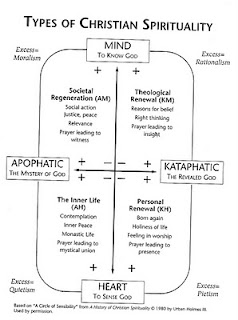Dallas Willard on Spiritual Formation... 4/9
"Healthy feelings, properly ordered among themselves, are essential to a good life. So if we are to be formed in Christ-likeness we must take good care of our feelings and not just let them happen. Feelings can be regulated by ordered, godly habits and self-control." (Willard 2002:93)
Transforming Feelings...Closely connected to thought life Willard -by looking at James 3-4 -points out our 'prisons of disorder and vane distraction' to look at how Spiritual Formation should identify our destructive feelings, sensations, emotion.
"The process of spiritual formation in Christ will transform our feelings by grace... a first step is to desire sincerely feelings that lead away from feelings that are contrary to what we understand of God."To deny such feelings would neurosis. Willard points out that when these destructive feelings happen the key question is "How can we deal with feelings?" His answer:
"The answer to these destructive feelings is not to deny that we have them or try to repress them. Â… The proper course of action is to replace destructive feelings with others that are good, or to subordinate them intelligently to a rational order so that they become constructive." 92Digging deep into Proverbs Willard goes on to make very clear distinctions between feelings that are good and life enriching, and feelings that are destructive.
- the fear of the Lord is the beginning of wisdom (9: 10).
- hatred stirs up dissension, but love covers over all wrongs (10:12),
- a heart at peace gives life to the body, but envy rots the bones (14:30).
- the cheerful heart has a continual feast (15:15),
- and a cheerful heart is good medicine, but a crushed spirit dries up the bones (17:22).
The danger as Willard points out is that:
"We do not go at the change the other way around, trying first to root out the destructive feelings. That is the common mistake of worldly wisdom and of much 'religion' on such matters. But we know that life in Christ brings the fruit of the Spirit, and destructive feelings, and actions, will be replaced. Love, joy and peace fostered in fellowship with God simply crowd out fear, anger, unsatisfied desire, woundedness, rejection. There is no longer room for them. Well, perhaps there is for a while, but increasingly less so.” (Willard 2002:104)The question is what needs to be crowded out? Let that positive movement take control.
----
Dallas Willard on Spiritual Formation... 1/9
Dallas Willard on Spiritual Formation... 2/9
Dallas Willard on Spiritual Formation... 3/9

Comments
Despair, fear, anxiety, are all experiences that can be reflected on this way, and how we get from there to joy once again is often something I explore with people.
Those who give 'platitudes' are wrong, in that they are almost always infuriating and unhelpful, but they contain the seed of truth that there are pathways we can take if we give God time that have a destination, and if we tread carefully through genuine acknowledgement of our feelings and interaction, or enter a listening contemplation, on these with God we can find our destination of joy again - God wants us to be happy! :0)
My experience is that healthy attitudes 'emerge' from this process over the years. Rather than being forced on us by others, they grow naturally as we learn how to thrive in our own inner lives in the company of the Trinity.
I think I still prefer holiness... It's quicker.
A brief question (for an incredibly busy man):-
Holiness starts with conviction and then moves rapidly into repentance culminating in consecration. Do you think Willard would see this as "trying first to root out the destructive feelings"?
When he says "That is the common mistake of worldly wisdom and of much 'religion' on such matters." Do you think the latter part of the sentence refers (among other things) to Wesleyan holiness?
Love and prayers A
PS Thanks for the email Beth is doingfine :-)
Love the blog.
I'm a musician and I'd be honored if you'd check out my music. All my music is free on my site, and I just wanted to share it with you.
I don't want to be an annoyance, so if this message bothers you please delete it and accept my humble apology.
___________________________
www.SeanDietrich.com
"All my music is free."
"...refers (among other things) to Wesleyan holiness?"
I'm not sure that it does in that John Wesley it seems was a touch more process in holiness than meets the eye. PPalmer on the other hand seems to have moved the bar.
I took Willards sentiment as questioning those that have made a religion out of holiness and sees the inherent dangers there-in.
Does holiness that is quicker out strip God's inworking as in Phil 2? :o)